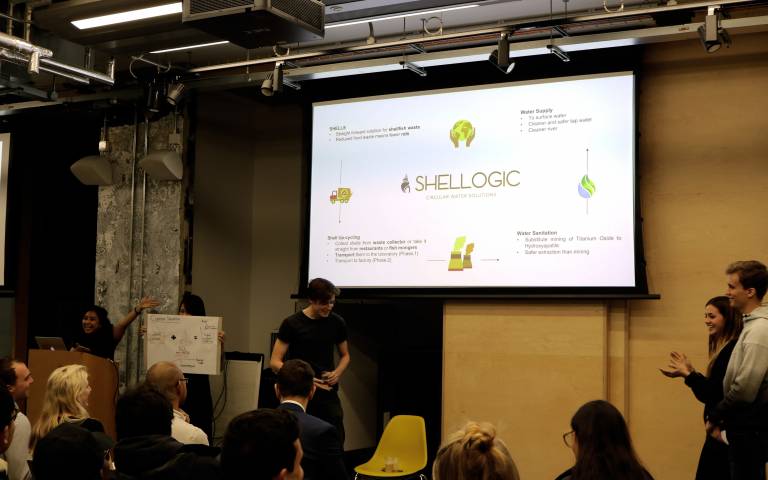48 hours, 5 London locations - UCL ISR students 'hack' real world problems
25 January 2018
UCL ISR hackathon challenges students to unleash imagination and catalyse change by rethinking resources across 5 central London locations over 48 hours.

“How can we design cities that work for everyone, consume less resources, substantially reduce GHG emissions, eliminate air pollution and create a healthy environment and sense of community?”
On the 23rd January 2018 five teams of students from the MSc Sustainable Resources were asked this question for the Circular Economy hackathon ‘circular liveable cities’. Each team were given a central London location and asked within 48 hours to identify a current limitation or inefficient use of resources and deliver a specific solution through business, policy, and community action.
Kicking-off of the 2-day hackathon, presentations were given by two entrepreneurs to inspire students with their innovative businesses. Speakers were Ryan Robbinson - CEO of Aeropowder an award-winning start-up creating novel materials from waste feathers, and Olivia Sibony - Consultant at Angel Investment Network and Founder of London GrubClub.
Once the challenge was revealed, students visited their allocated locations. By observing the local area and speaking to the local community the students identified underutilised resources that could be used to create community impact through a profit-making business idea.
Returning to base, with expert mentoring, the students developed their ideas, building them over the next day into business plans. These plans ultimately lead to the pitch – a presentation in front a panel of judges. Judges included, Ryan Robbinson – CEO Aeropowder, Hal Tyler – Entrepreneur and Consultant at Angel Investment Network, Arthur Kay – Founder and CEO BioBean, Andrea Crump – London Waste and Recycling Board, Prof. Raimund Bleischwitz – Deputy Director UCL ISR, Dr Teresa Domenech – MSc Sustainable Resources Course Director.
The panel scrutinised each groups resource saving potential, innovativeness, community value, scalability, adaptability and relevance. How unique are the solutions? Do the projects positively contribute to the local community?
Whilst the competition was fierce with a diverse selection of innovative ideas, after careful deliberation, two winning groups were chosen:
Winner ‘Shellogic’, based in Borough, utilised shellfish waste for water purification. The waste would be collected either from waste collectors or direct from restaurants and fish mongers, initially in Borough before being scaled across the country. Once collected, the waste would go through treatment to extract Hydroxyapatite which can be used for the removal of micro-pollutants from water as a direct substitute for the currently used, mined substance Titanium Oxide.
Also winners of the evening were the team inventing ‘Camberwell Spirit’ a sustainable distillery for Sound London. Faced with immense amounts of food waste created by the weekly food markets and local green grocers and the looming presence of gentrification, Camberwell Spirit would alleviate the cost of waste collection for local green grocers and the tax payer by fermenting the food waste into an alcoholic spirit to be sold locally.
The other contending teams were:
The Nine Elms Construction Waste Management & Co – Increasing the reuse of construction materials around Nine Elms in North-East Battersea by creating an online platform for construction companies to sell on waste materials in the local area.
Beetroof – encouraging the workers of Mayfair to engage with their surroundings by offering rooftop gardens with subscription access for businesses to encourage their employees’ health and wellbeing.
acceLEArate – based in Upper Clapton, acceLEArate would offer mediation between the community and landlords to acquire derelict buildings and form accelerated community cooperatives, such as a microbrewery using waste bread from local bakers to make beer.
 Close
Close

